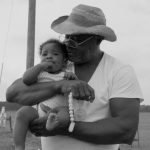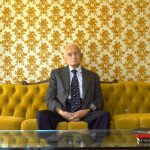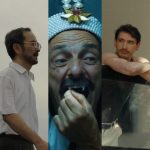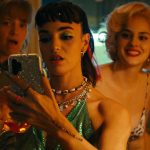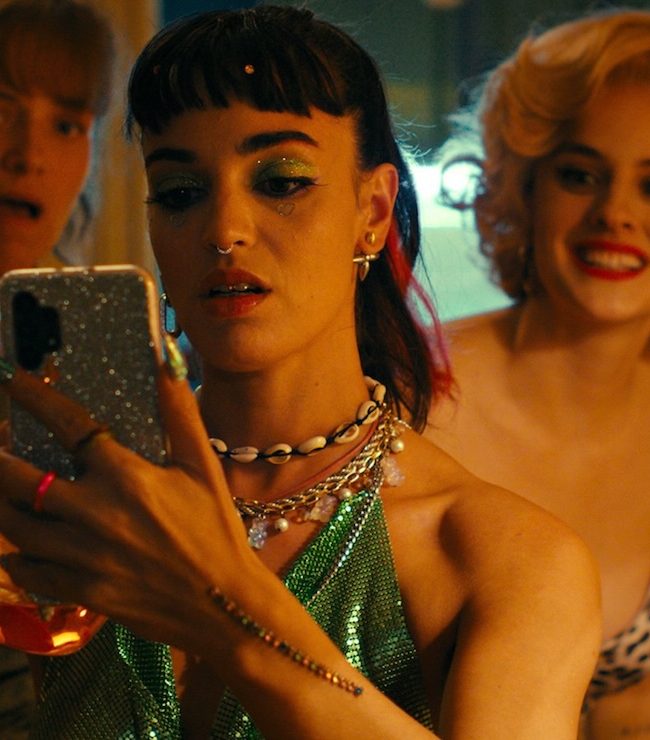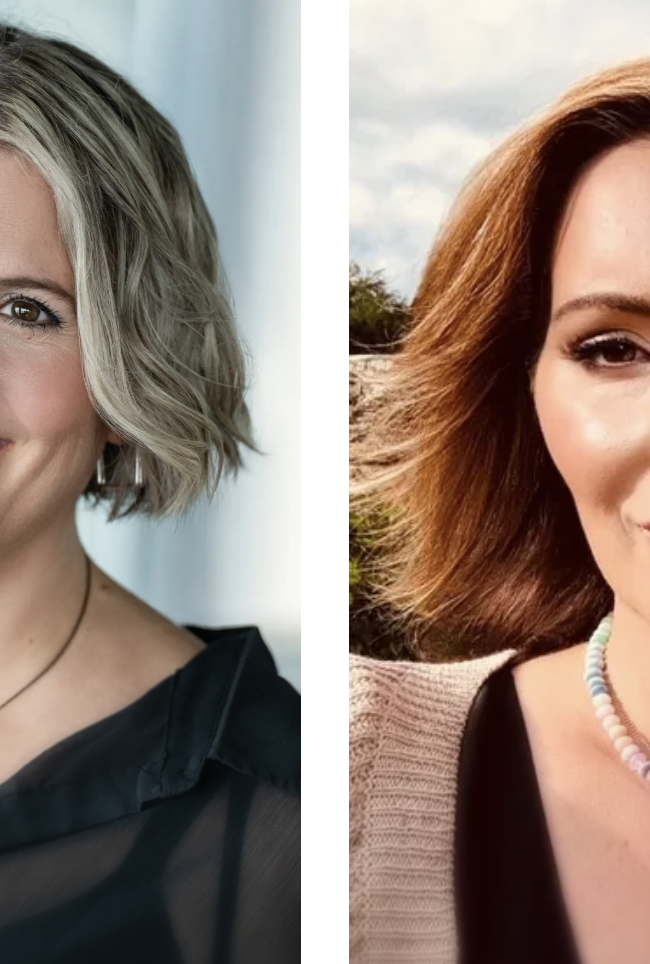A Conversation with Jason Patel, Ben Hardy, James Krishna Floyd & Sally El Hosaini (UNICORNS)
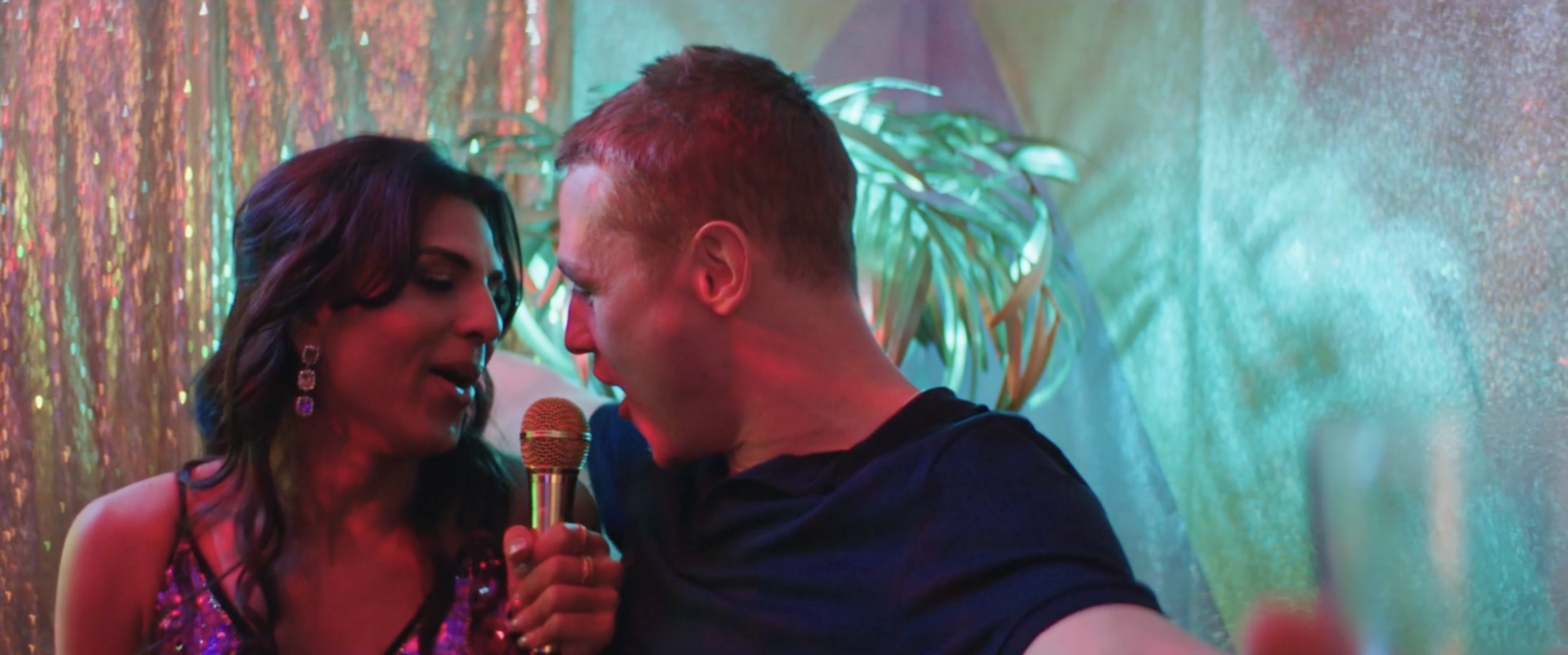
Unicorns is a cross-cultural romance that follows Luke (Ben Hardy), a single father from Essex who works as a mechanic, and Aysha (Jason Patel), a British Indian drag queen living a double life. When their paths collide at an underground club in East London, an emotional search for love and identity is sparked. The film explores the Gaysian scene while examining how two people from vastly different worlds navigate love, family expectations, and the courage to be authentic.
The film features compelling performances from Ben Hardy, known for his roles in Bohemian Rhapsody and 6 Underground, alongside Jason Patel in his feature film debut. Co-directed by BAFTA-nominated Sally El Hosaini (The Swimmers) and BIFA-winning filmmaker James Krishna Floyd (My Brother the Devil), Unicorns premiered at TIFF Together with the cast, these filmmakers have created a heartfelt story about finding home in unexpected places. The following conversation was edited for length and clarity.
Jason Patel & Ben Hardy
Hammer To Nail: The chemistry between Luke and Aysha is central to the film’s success. How did you two build that connection, especially given the unique circumstances of their relationship?
Jason Patel: Chemistry is something that you can’t really buy. You can sometimes manufacture it, but we had a really good rapport. We started off on a really good foot and it was nothing that we forced.
Ben Hardy: I think it happened quite organically. We’re spending a lot of time together because we were filming an independent film where the two of us were in most scenes together, so we’re constantly spending time together. Like Jason said, we had a very natural rapport from the get-go. Trying to artificially manufacture it and make us closer would have probably had the inverse effect.
JP: Normally before we start a project, people exchange numbers and get to know each other. But we didn’t have that. We actually got to know each other properly from the first day. We got to know each other through the film.
BH: The directors deliberately kept us apart. We did a chemistry read when we were both cast and then they kept us apart to make that chemistry palpable so that when it came to day one, we shot the sex scene and those nerves were still there.
HtN: Jason, the Gaysian scene can be described as hyper-competitive. Did you experience or research that dynamic and how does it affect Aysha? And Ben, Luke comes from Essex and works as a mechanic, a very traditional masculine space. How did you research and embody that specific cultural background?
JP: It’s the same feeling as when you’re an actor in an audition waiting room and everyone’s eyeing each other up, fighting for scraps. You’re all going for one job. Imagine there’s only one job and there’s 15 of you, and that’s the only job that can pay their bills. The stakes are really high. That’s where jealousy comes from. It’s like a pressure cooker of feelings and situations that sometimes explode, even though it comes from a good place. These people actually have a lot of love and support for each other, but it’s just like siblings that jaw at each other. You can fight and then the next second you can be like, “Want to go for pizza?”
BH: From my perspective, I didn’t grow up in Essex, but I grew up in a similar sort of traditionally masculine environment. For me, it was just drawing upon that. I was raised in quite a stoically masculine, stereotypically masculine environment, as a lot of guys my age were. I had a lot to draw from really. While I didn’t have Luke’s exact experience, there were things I wanted to do as a kid that weren’t stereotypically masculine. If you did those things in my town you were looked at like, “What’s going on with you?”
HtN: Jason, the press notes mentioned that realism drag queens are inspired by Bollywood item girls and are the opposite of RuPaul style drag. Can you explain that aesthetic difference and how it influenced your performance?
JP: RuPaul style drag is very much a heightened look. It’s a performance look. It’s really exaggerated. But in Asia, specifically India, the drag queens have very realistic drag, and it comes from the historical background of the hijra community and trans culture there. Even if you look at the drag that comes from Thailand, Philippines and India, they all look so real that they could just walk in everyday life and look like real women.
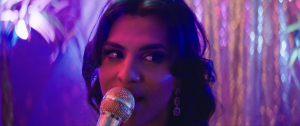
Jason Patel in UNICORNS
BH: It has to be completely believable for this story to work. If Luke wasn’t convinced that Aysha wasn’t a realism drag queen, Luke wouldn’t have pursued him. For her, he needed that to maintain the idea that he was straight. He needed Aysha to be a realism drag queen.
JP: Contextually, in India and in that Bollywood scene, the item girl actually stemmed from the realism drag queen. When you see Aysha perform, she is the item girl. That’s inspired by the Mughal empire and influenced Bollywood movies where they would perform and have these big numbers for men. Declarations of love or expressing emotions or sexiness to feel wanted. That really influenced a lot of mainstream media.
HtN: Luke’s relationship with his five-year-old son really seems to ground him. How did working with Taylor Sullivan help you find Luke’s paternal side, and how does fatherhood influence his journey with Aysha?
BH: Sally and James, the directors, were very good about creating the chemistry, and chemistry sounds a bit weird because we’re talking about a child, but that’s what it is with Taylor. They didn’t want me to be standoffish with him. They wanted quite a physical relationship. There’s a scene where he’s playing up and I can pick him up and chuck him on my shoulder, not rough, but not delicate. Sometimes in films, you see actors being very delicate with child actors, but they wanted it to be physical, like in Rust and Bone.
Taylor (Sullivan) himself, and also Katie and Nick, his parents, were so helpful. I lived in Brighton, and they’d come down and we’d go on the fairground to do rides, similar to the fairground scene in the film actually. That fairground scene has a huge impact on Luke because it’s another barrier for him. The idea of what will my son think about me being with this person? Seeing it through how they get on, but also what’s my son going to think about me being with a Gaysian drag queen?
The fact that he’s so innocent about it. Taylor’s not hating on Aysha for being who she is. He’s just innocently enjoying her company. He’s just seeing the person. I think that had an impact on Luke. He learns from his son in that way.
HtN: The initial sequence where you two meet is so well done. We follow Ben’s eyes into the club, watch Jason’s performance, and then have this initial flirtatious moment followed by the kiss. This leads to Ben’s vicious reaction when he sees the Adam’s apple. What was important to you both in this introductory moment?
JP: Their meet-cute wasn’t like “I dropped my books, I see you, now they’re in love.” It was two people who caught each other’s eye in the club and went after each other, but had no idea what that was going to lead to.
BH: It’s all really primal. There’s not that much said really. There’s something quite primal about it, not like “Oh, so you have daddy issues? I have daddy issues too, let’s talk about them.”
JP: They were like two people having to hold back from ripping each other’s clothes off.
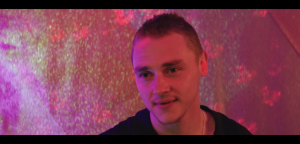
Ben Hardy in UNICORNS
BH: For me, what was important and I think for the filmmakers as well, was that it was believable that Luke would think that Aysha was a woman. Luckily we found this beautiful person right here. I thought that was necessary. A lot of people, and I know actually a lot of investors were like, “I just don’t know if we’re going to buy that on screen.”
JP: Or even if you can find that person.
BH: If you can even find it in the first place. Does that exist?
HtN: The fight sequence at the midway point is also great, but what interests me most is that it winds up in this vulnerable moment where Jason, without your wig, you say “please take me home.” What was important to both of you here?
JP: I remember when we did the full take of that, we just held it for so long. It was just that moment because there was a lot of adrenaline and you’re going from one crazy thing to being like, “What the fuck is going on?” You’re just like, “I need to get out of this situation,” and Luke was probably the only person Aysha felt she could trust in that situation because he’s the only person that’s an outsider to that scene.
BH: I know that for the filmmakers, they were very much concerned that they didn’t want this to be slapping and throwing handbags at each other. This is an incredibly aggressive fight. I suppose from Luke’s perspective, aggression is the language he understands. I think it does play a part in his connection with her. The wig coming off was not in the script. It was ripped out and then we just kept going.
JP: You don’t want to stop because the magic happens in things that are unplanned. I like that – “aggression is the language that Luke understands.”
HtN: There’s a massive contrast in the tone of the nighttime scenes versus the daytime scenes. Was that something you guys were thinking about in shooting those sequences?
BH: I suppose maybe the night is a bit more concealing. Maybe in terms of Luke, he’s hiding with Aysha. He’s safe because they’re either in the car in their private space or they’re off on the other side of the country where no one’s going to know him, so he doesn’t feel like he’s going to get caught out.
JP: Maybe at nighttime, even though you’re in a public space and you’re driving, you have the sense that you can feel protected. It’s a place where you’re not being watched. Same for Aysha, there’s no physical person watching. That’s what’s good about the car, because they’re concealed and they’re moving, so they’re constantly on the go. That can drive their energy forward. Because they don’t necessarily look at each other during that, they’re saying things without a lot of eye contact.
BH: I agree.
HtN: There’s such a sexy allure to the nighttime sequences and then a very dull, piercing feeling to the daytime scenes.
BH: You don’t see Aysha during the day.
JP: No, you don’t.
BH: David (Raedeker), the DP, working with Sally and James, really wanted to create the contrast between the vivaciousness and colorfulness of Aysha’s world and then the grey nature of Luke’s world. Through the cinematography as well as the costume, that was definitely something that wanted to be achieved. From Luke’s perspective, it was about seeing he’s living in a sort of depressed, definitely depressed, not diagnosed depressed, but probably would be if he went to the doctor, which he would never do, gray existence. Aysha comes in and injects color into his life through love and through their connection.
HtN: Finally, I’m wondering about that penultimate conversation you guys have before you kiss at the very end in the car and in the apartment. It’s such a brilliant feat of acting from both of you. What was your thinking going into this moment?
JP: I was trying not to cry. I felt so bad for these characters when we’re in the car with the hand, and then we have to get out. I’m supposed to look back, but I actually just walk straight into the door. I felt so sad.
BH: The weight of the importance of those scenes definitely played on us, trying not to let that inner voice come in and get in the way and actually just get it instinctually played. I really love that section of the movie. Luke going to Aysha’s house and meets the family and all that before he even goes up to the room. What I love about it is that Luke really opens himself up in that moment. He’s saying “I love you exactly as you are.” For him to say “don’t go” and to get shut down is huge.
James Krishna Floyd & Sally El Hosaini
HtN: For The Swimmers Sally was solely credited as director. For this you two are co directing, why for this project was that necessary and what benefits come with co directing
Sally El Hosain: For this project, I’ve been hearing about it as James was developing and writing the script. I read the drafts and fell in love with the characters and the worlds. I really wanted to jump in. But at the same time, it felt so much like it was so much Jason’s film and script, that it would not feel right for me to do it without James every step of the way. If I had one word to describe how it came together, I’d say it was organic. It wasn’t a conscious decision initially for us to work in that way. We fell into it. Even at the very beginning, we were like, “How is this going to work? How are we actually going to work together and co-direct this?” We ended up both doing everything. That was just the natural way that it worked, and it benefited the project because I genuinely think we ended up with a better film as a result of both our brains. We complemented each other so well. This is such a personal story for James and comes from his family and lived experience. At the same time, the practicalities of doing an indie low budget film, when time is really pressed, you could do double the amount when there’s two of you.

UNICORNS co-director Sally El Hosain
James Krishna Floyd: I think ultimately because Sally and I are together in real life and we work together a lot, whenever I have a project on my own or she has one on her own, we always end up having a little peek over the shoulder and going, “Oh what’s that?”
SE: Giving each other notes and opinions.
JKF: We’ve realized that we end up working together on everything, even if we’re not fully credited. We’ve just accepted that we have the potential to be a duo on everything that we do. This one, for whatever reason, she responded to it very positively and her enthusiasm was like, “Okay, cool. We’ll just jump on and we’ll try to direct it.” We’re big fans of looking at a project and going, “What can we bring individually to it?” and trying to get your ego out of it and not think too careerist about what’s best for the film.
HtN: James, you met Asifa Lahore seven years ago and that sparked this project. How did your collaboration with her as consultant and co-producer shape the authenticity of this story?
JKF: It was everything. I had known about the Gaysian scene, the queer South Asian scene that you see in the film. I kind of dabbled in it a little bit when I was younger. But Asifa at that time was really the beating heart of the entire Gaysian community. She was the only one who was the out Muslim drag queen who was in the papers. I got to know her and took her out for a meal at King’s Cross. I pitched this idea of wanting to do a film set in her world. I said I’ll only do it with your blessing. Luckily, she had seen a film that myself and Sally had done years ago called My Brother the Devil that I’d acted in, Sally directed and she loved it.
From then on, I got to know a few hundred people that would have inspired all of the stories and characters that are in the film. Everything that happens in this film either happened to Asifa, happened to me, or to one of the queens that I know. There were queens acting in the film. A lot of the supporting actors are essentially playing themselves. It’s their own experience. Val, (The Brown Queen) who plays Zina, the best friend, one of my favorite characters, this is the first time Val’s acted, but she’s brilliant. She’s putting her whole life experience on the screen.
HtN: James, you described the attraction between some Gaysian queens and white, feral, alpha male men. How did you both develop Luke’s character to explore that dynamic authentically?
JKF: The roots of it are my family. It’s definitely based on some of my family and also based on the real Lukes that I met when I was at these nightclubs. There’s quite a big fetish from some of the queens towards outsiders who are coming into the Gaysian scene. These Brad Pitt looking alpha male, feral white guys from the East End.
They have quite a few things, first of all, they don’t have the same cultural or religious baggage that often comes, unfortunately, in a lot of our South Asian community. I think there’s something really enticing to the queens where they want to live out their own Bollywood film. That’s really what their life is about. In the traditional Bollywood film, it’s that old cliche of wanting that hyper masculine king or prince to protect you as that young woman. But when you do that with another South Asian, I think it can make it even more messy because you’re doing it within a community that for the most part is oppressing you and feels like what you’re doing is wrong.

UNICORNS co-director James Krishna Floyd
A big key to it is the casting. Ben Hardy as Luke is incredible. Ben has a very unusual quality that we found very hard to find in actors of our generation, which is that he can say a huge amount with no words. It’s all underneath. He doesn’t need to show off with extra nuances on the surface, the nuances are all internal. That’s something that in this social media generation that we live in, where everyone’s talking a lot, it’s very hard to find.
SE: Ben also embraced putting on weight. He went to a mechanics garage and hung out with real East End, Essex mechanics, and learned and did some work with them. Putting on that bulk and trying to ground Ben more physically in his body for this performance was important. Many experienced actors sometimes can be control freaks about their performance and overthink it. We did everything we could to encourage Ben not to think and to just really live in the moment and be in the moment because Luke isn’t a big thinker. He’s someone who’s very impulsive. That’s how he falls into this story. He isn’t thinking ahead. He’s just doing what feels right in the moment. Getting him out of his brain and into his body so that the body leads and the brain comes after was how we worked with Ben.
HtN: The introductory sequence in the club is so well done. The allure of their flirtatious moment, the violence when he sees the Adam’s apple. It works as a nice microcosm for the film. What was your thinking in this intro moment?
JKF: I’m glad you mentioned it because it’s basically a real moment that happened to me. I was going up and down the country with Asifa to all these clubs. There was one club in Birmingham called Club Sarti. It’s a mixture of queer people and straight people. I walked in with Asifa and I saw this beautiful woman and I was like, “So who’s that? Is she a lesbian?” Then of course Asifa looked at me and just rolled her eyes and I went, “Oh, okay, right.” Then Asifa introduced me to this beautiful drag queen, I won’t say who they are because they don’t want to be named, but I got to know them quite well.
I was chatting with this queen in the club, and it was also a little bit dark. Then it wasn’t until outside when there was a lot more light, there was a big heater there and people were taking pictures, that was where I saw the Adam’s apple. But it was an incredible moment because even I knew what the deal was.
What people don’t understand, and I hope this film can educate, is that in South Asian culture, we have something called realism drag. It’s very different from American style drag, which I love RuPaul, everything is super big. It’s putting on your armor in an obvious sense. It comes from the civil rights movement. It’s angry, big and supposed to be unsubtle. Realism drag is the complete opposite. It’s all about passing in a very real, subtle way. It’s been something in our culture for a long, long time, and this comes from Bollywood, the item girl. The queens in the Gaysian scene in the UK have really taken that to another level. It’s such a lot of work, it’s really an art.
HtN: The fairground sequence between Jamie, Ben and Jason is such a crucial moment in the film. Can you talk about what was important to both of you here?
SE: This was about creating family and bonding. Obviously when you’re working with children, you do things for real, but this was a great example of what we did a lot on this film, which was guerrilla filmmaking. After wrap, a core group of us went down to the fun fair because we didn’t have permission and had to film all of that stuff guerrilla style. The people you see in the background are the rest of the crew pretending just to be at the fun fair because the fun fair was closing. It was like half an hour before closing, quite empty, so we had to fill the shot quickly. We were really flying by the seat of our pants, but it just goes to show sometimes you capture such incredible moments when you’re under pressure like that.
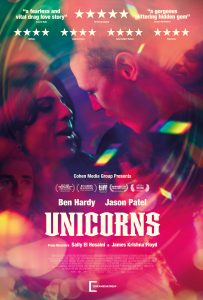
JKF: You’ve got to give the whole team a lot of credit. The fact that all of our HODs and our crew and cast were willing to do that is really important. In particular, our brilliant DOP, David Reddiker, who we’ve worked with a few times now. David broke down the whole camera, it was half its size. He didn’t have the same freedom with focus and all these things. We literally had to follow the actor and just go with the flow. Some of the best stuff in the film, I think. It just shows you, sometimes simplifying your art is the best thing. The filmmakers who’ve been doing this for years still do it, look at Sean Baker, he’s brilliant at it. James Cameron’s fantastic. People don’t realize this, but in The Terminator film, there’s loads of guerrilla stuff. You need that immediacy, but you have to have a team that’s prepared to do it and go along with you for the ride.
HtN: The fight sequence is very intense, but what fascinates me most is the quiet moment right at the end where with the wig off, Jason says “take me home.” Can you talk about what was important to both of you at that moment?
JKF: I love that. I’m so glad. you’re the first person that’s asked about that line. I changed that line so many times. Eventually it was “Jason, just say ‘take me home.’ That’s it.” Because there was more back and forth originally. I think a lot of the film hinges on that. Obviously it’s a love story, but really it’s about trying to figure out where your home is. What is true to you? Ultimately, with these two characters, I think that changes in the film. They’re very confused. This has been said many times before, it’s going to sound like a cliche, but ultimately when you fall in love with someone, or you have some sort of connection with someone or a group of people, that’s what really becomes your home. I think we live in a world where we think that our home is at home on our laptop or on our phone, doom scrolling on X. It’s not. Other people are what really is our home and our community. That’s really what that line was about.
SE: But also the quality of Aysha in that moment, because up to this point, Aysha’s been able to wear her armor and really present how she wants the world to see her. Certainly in front of Luke, she’s been in control, able to command the love and adoration of everyone around her. Then there’s this heightened aggressive moment where the adrenaline makes her lose herself and suddenly she’s naked. The wig’s off and she’s suddenly absolutely naked in front of Luke and terrified by that.
JKF: That was based on a real thing that I had seen with these two queens who had this really violent interaction. Afterwards, they were sort of best friends while sitting on the back of an ambulance. What’s really interesting is that when she says “Take me home,” I just realized that really she’s saying “take me with you.” Realizing that home may be Luke. That’s what it’s about.
– Jack Schenker (@YUNGOCUPOTIS)

